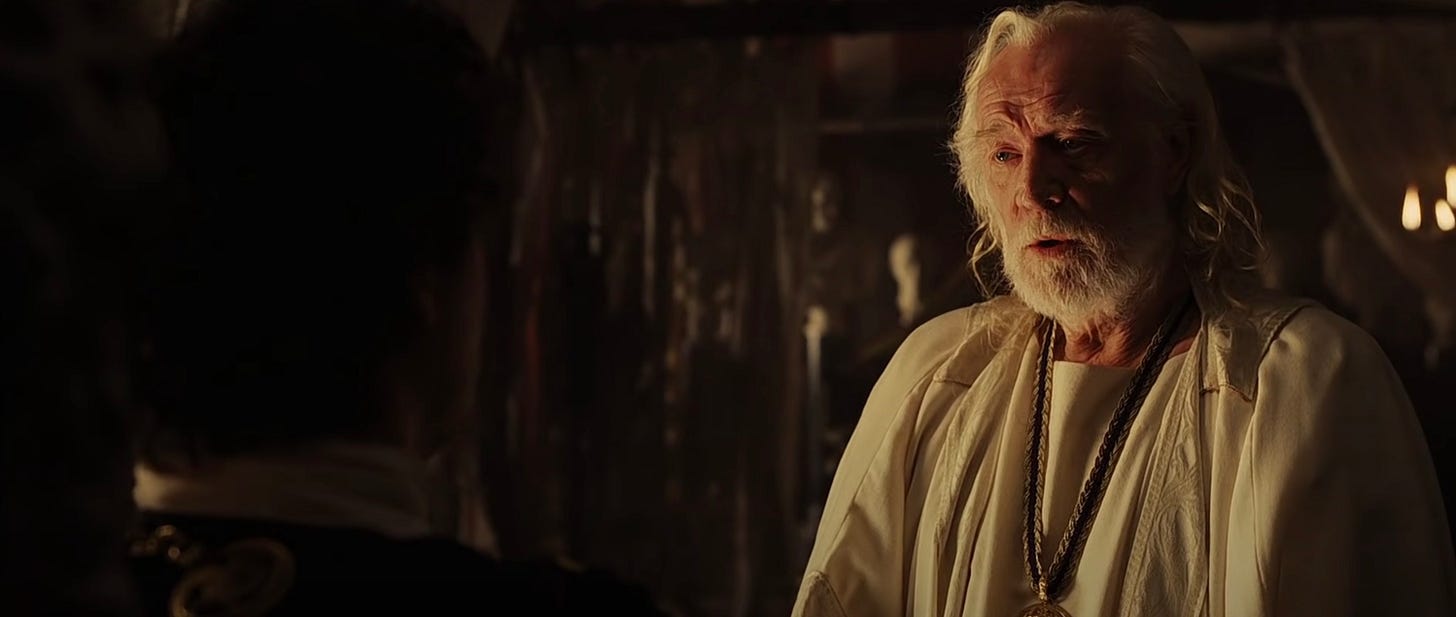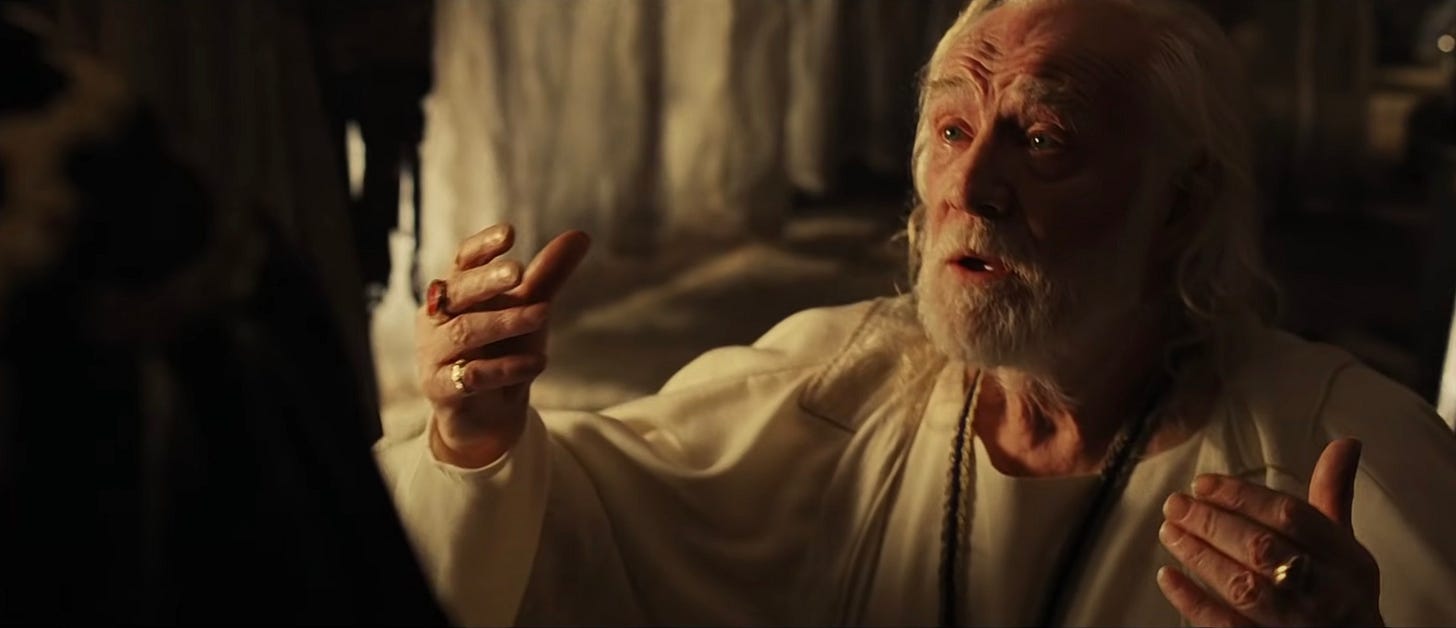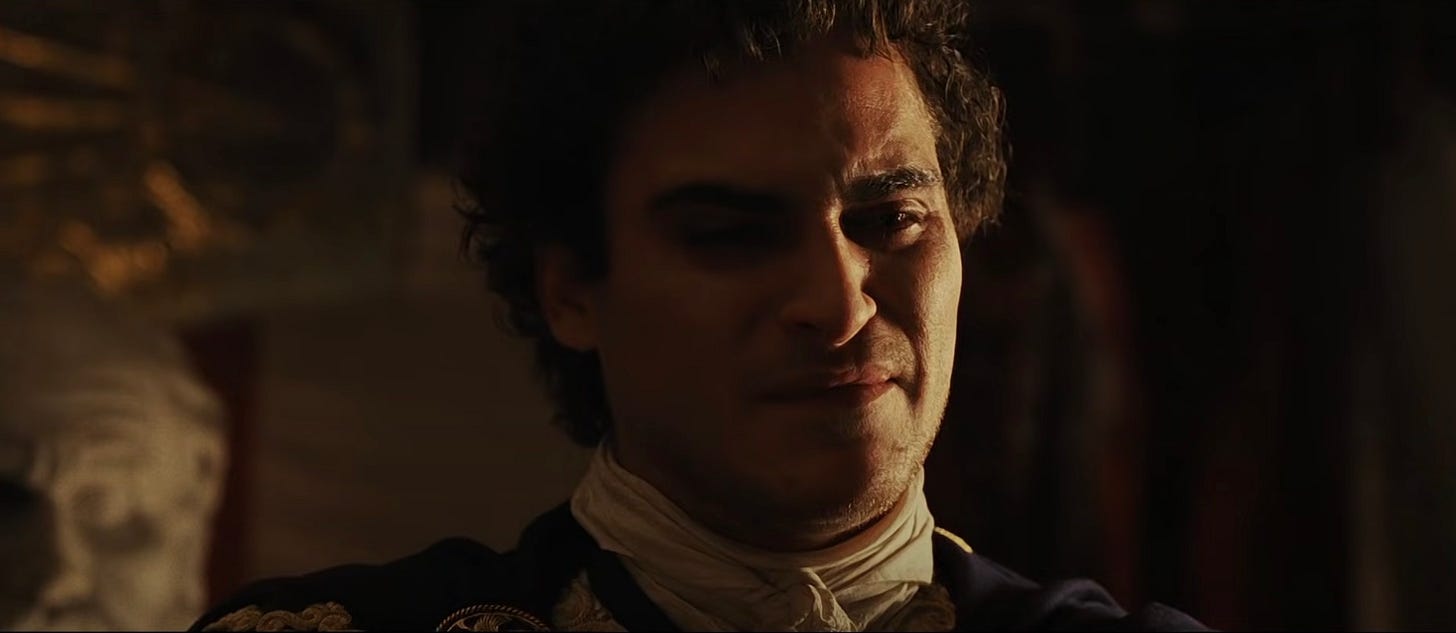This Is the Best Scene in ‘Gladiator’
"I would butcher the whole world if you would only love me."
Napoleon, you are likely aware, comes out tomorrow. The last time Ridley Scott and Joaquin Phoenix made a historical epic together, the movie was Gladiator, and it made half-a-billion dollars at the global box office and netted them both Academy Award nominations (it won several other Oscars, including Best Picture and Best Actor, for Russell Crowe). It’s hard to imagine Napoleon will be as successful, but stranger things have happened.
So. Here’s my hot take on Gladiator: It’s a good movie. It’s not a great movie. It’s not Ridley Scott’s best movie (still Alien), and it’s not Ridley Scott’s worst movie (probably Exodus: Gods and Kings?). It’s very grand and it’s a Ridley Scott film so naturally it’s well-made, and it’s more or less narratively solid (story-wise, it’s mostly just Braveheart but set in ancient Rome instead of Scotland… but Braveheart was largely just Spartacus set in Scotland instead of Rome, so fair is fair, I suppose).
But it’s also basic… and I mean that in the slangiest sense of the word. Gladiator is a Starbucks Pumpkin Spice Latte, Gladiator is Lululemon yoga pants, Gladiator has Thursday nights carved out for a glass of rosé and a new episode of The Bachelor.
Having said that, the movie does one have genuinely GREAT scene, which occurs roughly a half-hour into its runtime: The confrontation between the emperor, Marcus Aurelius (Richard Harris), and his son and heir, Commodus (Phoenix). Simply put, these four minutes of drama have a level of emotional complexity which, frankly, the rest of Gladiator lacks.
First, the set-up:
In a previous scene, Marcus tells his greatest general, Maximus (Crowe), that it is his dying wish for the Roman Empire to become a republic again - “to give power back to the people of Rome and end the corruption that has crippled it.” He asks Maximus to take over as the new interim emperor while power transitions back to the senate, but after years of war, Maximus wants only to go home to his wife and child - he has no interest in being the most powerful person in Rome.
“Maximus,” Marcus tells him, “that is why it must be you!”
“And Commodus?” Maximus asks.
“Commodus is not a moral man,” the emperor replies. “Commodus cannot rule. He MUST not rule.”
Maximus goes off to consider the offer, and it quickly becomes apparent his sense of duty is going to win out over his personal wishes.
Meanwhile, Marcus summons Commodus to see him. This is where we are at the start of Gladiator’s greatest scene.
Commodus shows up, believing that the time has come for him to be named emperor. Waiting for his father, he admires a marble bust of Marcus, touches its face.
Marcus enters: “Are you ready to do your duty for Rome?”
“Yes, father,” Commodus smiles.
Marcus bluntly breaks the bad news: “You will not be emperor.” Not only has he omitted a tactful preamble to soften the blow, but he actively pulled the rug out from under Commodus - for, surely, Commodus could not have known that “doing his duty for Rome” meant not ruling. The very phrasing is emotionally inept at best, cruel at worst.
Scott’s framing of each shot mimics the characters’ internal state and emotional relationships. Both of their faces are half-shrouded in shadow, as is befitting their love/hate dynamic. But whereas Commodus’ close-ups allow Marcus to loom both in the background (as a marble bust) and the foreground (his shoulder creeps into the shot), Commodus is completely absent from the reverse shot. When Commodus’ back is visible in a shot of his father, it’s an angled medium shot that emphasizes the literal distance between the two men, makes Marcus appear far larger than his son, and once again sandwiches Commodus between two iterations of his father. Marcus dominates these shots, just as he dominates Commodus’ life.
“Which wiser older man is to take my place?” Commodus asks, his voice already quivering.
Marcus reveals his plan: “My powers will pass to Maximus, to hold in trust until the senate is ready to rule once more. Rome is to be a republic again.”
Scott cuts from Marcus to Commodus immediately after Marcus says “Maximus.” Then he holds on the younger man, whose level of visual despondency increases, and doesn’t go back to the emperor until the line “Rome is to be a republic again.” Then it immediately cuts back to Commodus, who repeats the name of his father’s chosen successor: “Maximus.”
Commodus doesn’t say anything about Rome reverting to democracy. That’s not what bothers him. His father choosing Maximus, specifically, is what bothers him.
Seeing that Commodus is upset, Marcus reaches out to touch his son’s face - but Commodus recoils.
“My decision disappoints you?” Marcus asks.
Commodus replies by recalling a memory from his youth (note that of the three credited screenwriters on Gladiator - David Franzoni, William Nicholson, and The Aviator scribe John Logan - Scott specifically credits Logan with writing this speech):
“You wrote to me once, listing the four chief virtues: Wisdom, justice, fortitude and temperance. As I read the list, I knew I had none of them.
“But I have other virtues, father. Ambition. That can be a virtue when it drives us to excel. Resourcefulness, courage, perhaps not on the battlefield, but... there are many forms of courage. Devotion… to my family… to you.
“But none of my virtues were on your list. Even then, it was as if you didn't want me for your son.”
Commodus is now clearly fighting to hold back tears; he can barely make eye contact with his father.
“Oh, Commodus,” the emperor says, taking a seat. “You go too far.” His voice is smokey and wizened in a way that feels warm (not for nothing did Harris wind up playing Dumbledore a year later), but it’s not entirely clear if he intends “You go too far” to mean that he did want Commodus as a son, or if he intends “You go too far” to mean “You’re overstepping and you need to shut up.” Whichever it is, the reverse shot of Commodus now lowers slightly, which both replicates the shift in Marcus’ literal point of view and serves as an external signal of an internal change within Commodus: He appears to grow in stature, while the bust of his father shrinks.
Now the dam breaks, and Commodus continues while weeping:
“I search the faces of the gods for ways to please you, to make you proud. One kind word, one full hug, where you pressed me to your chest and held me tight, would have been like the sun on my heart for a thousand years.
“What is it in me that you hate so much? All I've ever wanted was to live up to you, Caesar. Father.”
Marcus reacts with earnest supplication, his own eyes wet as he gets out of his seat and down on his knees, opening his arms to offer Commodus the full hug his son desires: “Commodus. Your faults as a son are my failure as a father.” (Interestingly, Harris apparently came up with this line himself while they were filming the scene.)
Suddenly, the dynamic of the shot compositions flip: Commodus impedes on Marcus’ frame, but Marcus is missing from Commodus’ close-up, and the statue of Marcus behind Commodus is now obscured and out of focus.
Marcus’ atonement fails to placate Commodus, whose face tightens as his upper lip quivers in a snarl-like shape. This is the straw that breaks the camel’s back, the moment that pushes Commodus to a point of no return.
Now, my personal read on this moment has always been that while Marcus’ sincerity isn’t in question, his emotional IQ may be lacking. Why would he acknowledge Commodus’ “faults as a son”? Would it not be better to just say “Of course I don’t hate you, I love you”? But during his audio commentary for the film, Scott offers a far different interpretation of what about Marcus’ mea culpa triggers Commodus:
“If the father didn’t kneel, he would have been alive. The fact that he knelt and did this emotional reaching out to his son… the son had never seen this before in his life, and therefore didn’t like it. It made him feel uncomfortable and… there became [a] loss of respect for the father, even though he still loved him.”
And so Commodus embraces Marcus, bawling into his father’s head for a few moments. Then he takes a break to observe Marcus’ face. “I would butcher the whole world,” Commodus says as he now pulls his father back into the hug, pressing the older man tightly against his chest, “if you would only love me!”
Commodus literally smothers Marcus in the hug. Marcus struggles to no avail; his muffled cries cease as the film cuts to a shot of the marble statue. Marcus is now nothing more than a commemorative portrait.
The way this scene entangles conflicting emotions… the mere fact that there are multiple ways to interpret each characters’ words and actions… is what elevates the moment above the rest of Gladiator.
The scene is so good, in fact, that it ultimately serves to make Commodus a more compelling figure than Maximus.
See, what makes Maximus intriguing and multi-dimensional at the start of the film is the tension between what he wants to do (go home to his family) and what he needs to do (stay and become Rome’s new leader). Except, almost immediately after Commodus commits patricide, he orders the execution of Maximus and his family. Maximus, being a total badass, escapes, of course, but his wife and son are both killed. And suddenly, there is no tension between what Maximus wants to do and what Maximus needs to do: His mind is set entirely on the task of killing Commodus.
Understandable though that may be, it makes Maximus a less-interesting character. Any concern he has for fulfilling Marcus’ wish to make Rome a republic again seems like an incidental (albeit positive) side effect of his lust for vengeance.
It’s not even like Maximus is the underdog of the story! Sure, technically, he spends most of the movie as a slave, while Commodus commands the entire Roman army. But Maximus is basically goddamn Superman. He’s such a superior warrior that the arena fights are robbed of their danger, the other slaves come to respect him almost immediately, the crowd falls in love with him just as quickly, and he’s surrounded by powerful people conspiring to help him. His struggle is, in the words of that one guy from YouTube, “Super easy, barely an inconvenience.”
Commodus, on the other hand, finds that even with his father dead, he cannot get the love for which he so longs. And make no mistake - love is what Commodus wants. He explicitly says as much after learning that the men he tasked with killing Maximus not only failed, but lied about failing: “If they lie to me, they don’t respect me. If they don’t respect me, how can they ever love me?”
Commodus’ problem, of course, is that he’s a lunatic asshole. He’s in love with his own sister, Lucilla (Connie Nielsen), but doesn’t seem to understand why she won’t sleep with him, and he’s a craven despot, but doesn’t seem to understand why the citizens of Rome don’t like him.
That makes Commodus a weirdly tragic figure… not insofar as his actual constitution and actions, obviously… but from his point of view, Gladiator is the story of how everyone - including his own family - likes Maximus better than they like him. He’s a sad little boy who needed a hug from daddy. Or, put another way:
It’s easy enough to envision a version of the film where there was more of this kind of Shakespearean tumult, with each character experiencing paradoxical emotions about their conflict: What if Maximus and Commodus had once been close? What if Lucilla had once loved her brother despite his incestuous feelings? What if Commodus felt guilty about wanting to sleep with his sister… or about having murdered his own father, for that matter?
But the story ultimately settles for a more straightforward good guy/bad guy dynamic. There’s nothing wrong with that - plenty of great movies are built entirely on straightforward good guy/bad guy dynamics! - but it does tend to make for a story that is decidedly less… how to put this?… chewy. Gladiator works fine as Death Wish set in Ancient Rome, but it could have been so much more than that.










